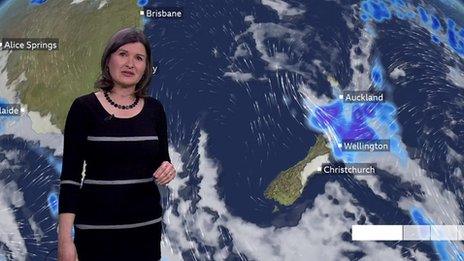Auckland floods: New Zealand city declares emergency after torrential rain
- Published
Watch: Airport flooded and homes swamped in Auckland
New Zealand's largest city has declared a state of emergency after torrential rain prompted widespread flooding and evacuations.
Friday's downpour in Auckland shifted houses, stalled traffic and cut power to homes and businesses.
The city is said to have received 75% of its usual summer rainfall in just 15 hours.
"The impacts of the last 24 hours will be felt by many in Auckland for a long time," said the national forecaster.
Auckland's mayor, Wayne Brown, has confirmed media reports that a body had been found in Wairau Valley on Auckland's North Shore. Mr Brown has said he is "deeply saddened" by the news. Police have not confirmed whether the death is linked to the flooding.
He has also said infrastructure and emergency services had been "overwhelmed" by the impacts of the storm. In a statement, Fire and Emergency New Zealand said it had been dealing with roughly 1,500 calls for assistance.
The New Zealand Defence Force is helping with evacuations and emergency shelters have been set up across the city.
Meanwhile, the mayor has defended himself against criticism that he was too slow to declare a state of emergency, saying he followed advice from experts.
Allow X content?
This article contains content provided by X. We ask for your permission before anything is loaded, as they may be using cookies and other technologies. You may want to read X’s cookie policy, external and privacy policy, external before accepting. To view this content choose ‘accept and continue’.

Ricardo Menendez March, a Green MP and Auckland resident, told the BBC that the area he lived in was quickly flooded and he had to evacuate, but was given shelter by a friend nearby.
"There were people who were unfortunately not as lucky - low-income communities, disabled people, migrant communities as well," he said.
Major roads were also blocked off by the floods, causing long traffic queues on highways, with several traffic accidents reported.
The flooding also disrupted travel to and from Auckland Airport. Domestic and international flights have now been grounded until at least 05:00 on Sunday.
An Elton John concert, expected to be attended by 40,000 fans, was cancelled minutes before it was due to start. Other public events planned for the weekend have been cancelled.
Footage online showed people trapped in waist-deep floodwater and rescuers carrying out evacuations on kayaks.
Other pictures showed grocery items floating down the aisles of several flooded supermarkets.
Allow X content?
This article contains content provided by X. We ask for your permission before anything is loaded, as they may be using cookies and other technologies. You may want to read X’s cookie policy, external and privacy policy, external before accepting. To view this content choose ‘accept and continue’.

New Zealand's new Prime Minister, Chris Hipkins, has tweeted to say the "Beehive Bunker" - a reference to the country's parliament building in the capital, Wellington - is helping with the co-ordination of the emergency response. Mr Hipkins is expected to travel to Auckland on Saturday.
The National Institute of Water and Atmospheric Research (NIWA), the country's climate science body, has said Friday was the wettest day on record for a number of locations in Auckland. Heavy rains have been forecast in various parts of the city for at least the next five days.
"It goes without saying that we need to have a conversation about how climate change is making these events more frequent and how cities like Auckland are massively underprepared," said Mr March.
While climate scientists have cautioned against attributing individual weather events to climate change, research by NIWA has found the warming planet is leading to more extreme weather events, external in New Zealand.
Forecaster Helen Willetts looks at the record breaking rainfall affecting Auckland
Related topics
- Attribution
- Published27 January 2023
